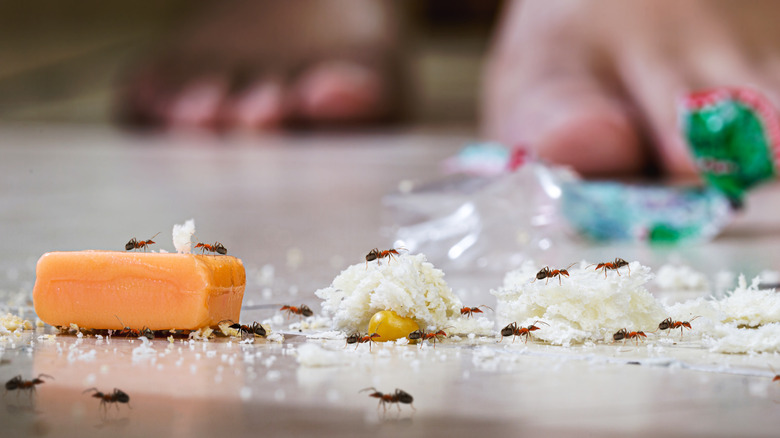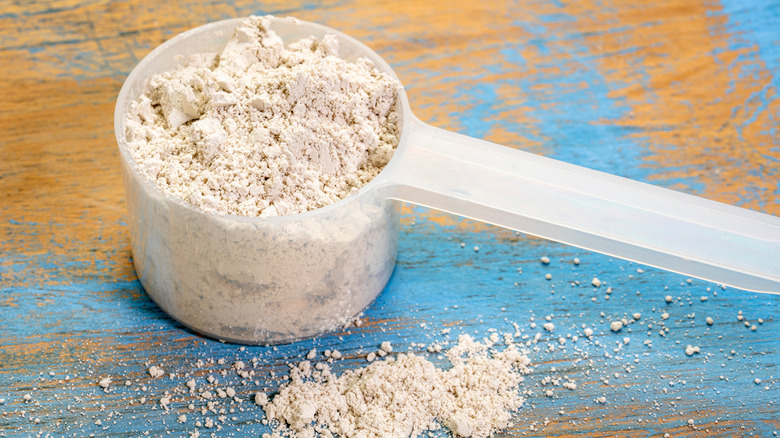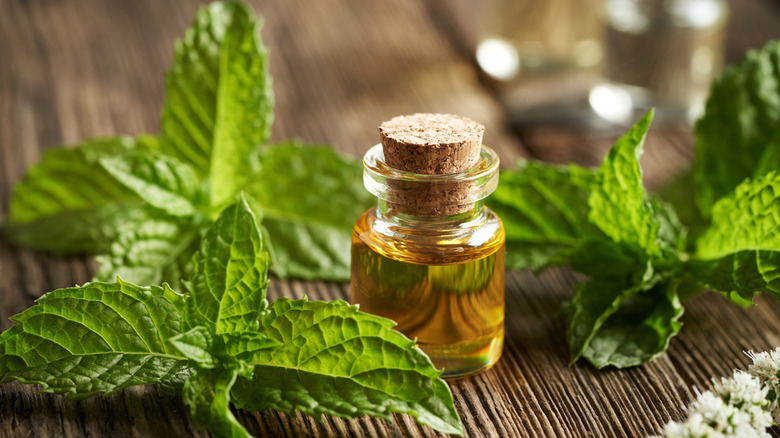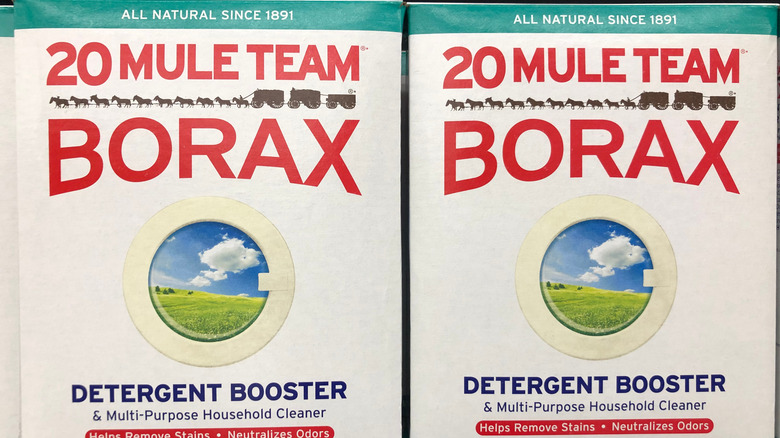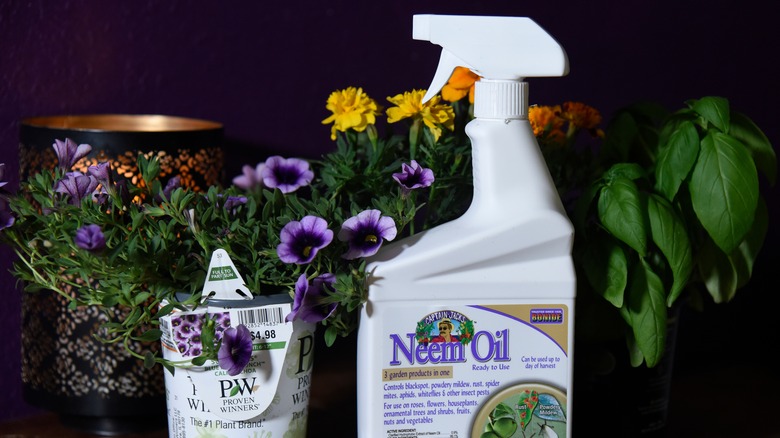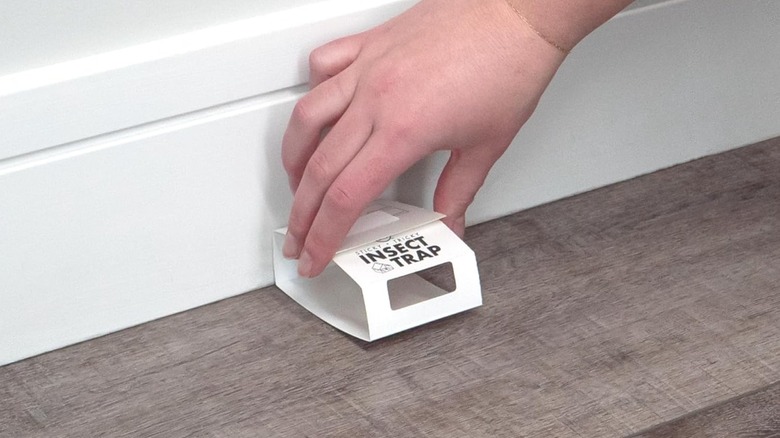Say Goodbye To Ants With 9 Natural Ways To Get Rid Of Them
We may receive a commission on purchases made from links.
Ugh, those ants are back again. Keeping them from overrunning your kitchen, bathroom, and other rooms in your home can feel near impossible. And, while spraying some insecticide or hiring a pest management company might help, you don't really want to expose yourself, other members of your household, or your pets to those potentially dangerous chemicals. Plus, ant sprays typically won't solve the problem for the long term. While they may kill any ants that they come into contact with, unless the queen is also killed, the ants will simply return in the near future.
So, instead of relying on chemicals that you're not comfortable with in the first place and aren't likely to deliver the results you desire, why not consider some natural remedies for getting rid of ants? These solutions focus on safer alternatives that don't come with the health risks associated with ant-killing sprays. Ahead, we'll share information about each approach, how to best implement it, and any other factors that you might want to consider.
Pour boiling water on the anthill to destroy it and kill the ants inside
If you're looking for tricks to eliminate anthills in your yard that don't require any chemicals, it doesn't get more natural than using plain ol' water. That's right, you can destroy anthills — and the ants residing inside them — with water from the tap. The key, however, is to bring it to a boil first. Once you've brought the pot of water to a boil and the water is between 190 degrees Fahrenheit and 212 degrees Fahrenheit, carefully carry it outside and pour it slowly over the anthill. Depending on how many mounds you have in your yard and how large they are, you will likely need to repeat these steps several times (including boiling more water).
While using scalding water can be effective, it is important to manage your expectations. It is only up to 60% effective, so you don't view it as a "one and done" solution. Also, this approach will be most effective if you are able to kill the queen. This is why you will want to use a lot of water (3 gallons or more) and slowly pour it over the hill to help ensure that it is able to reach deeper down to where the queen may be resting. Because of how the characteristics of anthills can change throughout the year, you're most likely to find success with this technique during the spring. At this time, the hills are more raised than they are in the summer, fall, or winter. One final caveat: Just as the boiling water can kill the ants in the mound, it may also kill any plants or grass that it comes into contact with. Be selective about where you try this approach to avoid killing wanted vegetation.
Apply citrus oil over the mound
Using citrus oil is another natural approach you can try to rid your home of ants. A study published by the Department of Entomology and Plant Pathology assessed the effectiveness of citrus oil. It found that orange oil, such as the Handcraft Blends Orange Essential Oil, emulsified with water was the most effective way to utilize the oil to kill ants. To create an emulsion of water and oil, all you need to do is to add the two ingredients to a container with a lid and shake them vigorously for several seconds to a minute. Once emulsified, the solution is ready to be applied to anthills in the yard.
The reason that citrus oil, and this orange oil and water emulsion in particular, is so effective comes down to one of its key components: d-limonene. This naturally-occurring compound is actually toxic to ants. This means that when the pests come into contact with it, they will die almost immediately. The compound will also interfere with the scent trail left behind by the ants, which will make it more complicated for any ants that didn't get killed to find food. If you have pets, it is important to note that d-limonene is also toxic to them, with cats being the most sensitive to the compound. So, be careful with where you apply it, or consider a different method to avoid accidental harm.
Use diatomaceous earth to dehydrate and kill ants
If you've never heard of diatomaceous earth, then you've been missing out on an effective — and ancient — natural pest control solution. Diatomaceous earth, like the RobiGuard Diatomaceous Earth Peppermint Powder, looks like a fine, white-to-gray dust. However, if you were to look at it under a microscope, you would see tiny fossilized remains. These remains, which can be up to 20 million years old, are from diatoms, which were tiny, one-celled organisms. After reading that description, you might be wondering how this natural garden staple could become your secret to controlling ants. Well, unlike many other natural and chemical control methods, the powder works by drying out the insects, eventually causing them to die. When ants walk over it, all those tiny skeleton fragments puncture their waxy coating, facilitating the loss of moisture.
Before you decide this is the miracle treatment you've been searching for, there are a few important things to consider when using diatomaceous earth for pest control. First, while it is not considered toxic to people or pets, the fine, dusty powder may irritate your throat, eyes, or lungs. Before applying it, put on protective gear, including a respirator mask, like the 3M N95 Respirator, a pair of gloves, and some goggles, such as the DeWalt Safety Goggles. It is also important to apply the powder correctly if you want it to deliver the promised effects. Take care not to make the application too thick. It doesn't take much to be effective, and if it is noticeable, the ants will be more likely to find a new route in order to avoid crossing through it. Using a bulb duster is generally seen as the best way to avoid over-applying the powder. If you know of any trails the ants invading your home have been following, it is also a good idea to apply the diatomaceous earth directly over them, as it will increase the likelihood that they'll cross through it.
Take steps to prevent ants from getting back into your home
Clearing up an ant infestation is great, however, if new ants are able to infiltrate your home, you're going to keep going through a vicious cycle of killing ants, enjoying a short reprieve, and facing a new infestation all over again. To minimize the chances of ants entering the home again in the future, you'll want to consider what may be attracting them and work to make it less attractive. One of the main things that draws ants inside is food. If there are lots of crumbs in the pantry, sticky spots on the countertops or floors, or other food items out for them to get, you must clean them up to remove the appeal. Food isn't the only thing that can attract ants; they are also attracted to water, so if you have any leaks or standing water, you should address those as well.
Once you've cleaned up what may be welcoming the ants into your home, take measures to seal the openings they used to gain entrance in the first place. This may involve some investigating on your part to look for openings around the doors, windows, or along the base of the walls. Use caulk — such as the Gorilla Waterproof Caulk & Seal Silicone Sealant — to close these cracks to prevent future ants from getting in.
The strong scent of peppermint oil can help repel ants
While you may enjoy chewing peppermint gum or sipping a peppermint hot chocolate on a cold winter's day, ants do not share your affinity for its scent. In fact, quite the opposite — they seem to absolutely hate the smell of it. This means that peppermint oil, such as the Brooklyn Botany Peppermint Essential Oil, can help deter ants and keep them from taking over your home. The menthol in peppermint oil is what is so offensive to them; it can interfere with their ability to communicate with other ants or find their way around. Because of this association, the pests steer clear of any areas where they detect the pungent smell.
However, it is important to point out that using peppermint oil won't eliminate your ant problem. While it can be effective at keeping ants out of specific areas of the home, such as your pantry, the scent will eventually wear off. Reapplying it can help, but it isn't the most feasible plan to stick with for long-term results. Using this approach to buy some time or as a quick repellent, however, could be highly effective.
Make a DIY bait using Borax with sugar
You might have some Borax in your laundry room right now. While it is most commonly known as a laundry booster, there are some genius tips for using Borax around the home. It can help with everything from keeping the toilet bowl clean, freshening your carpets, unclogging a drain, and yes, even killing ants. Borax is a toxic substance for ants that wreaks havoc on their digestive systems. So, if they consume it, they will die. However, the ants will not simply eat Borax straight off of your floor — it won't appeal to them undoctored. Instead, you can mix it with some sugar, which will attract the ants. When they bring the sugar back to their colony, any of the ants who feast on it will also be ingesting the Borax that you mixed it with.
This natural ant-control method is another one that you'll want to approach with realistic expectations. While Borax is toxic, it doesn't work instantaneously. This means that it will take some time for the ants in the colony to die from the dose in the sugar mix you create. You'll also want to create several traps to increase how much of the substance is brought back to up the odds that the queen also ingests it — if she doesn't end up dying, the colony will simply regenerate and your ant problem will return in no time. The effectiveness of the Borax may also vary depending on which ant species are invading your home and how many different colonies you're dealing with. Keep in mind that Borax will also kill plants, so be careful with where you use it in your home.
Target the ants using neem oil
Neem oil is another staple when it comes to natural solutions for pest control. While it can be effective at killing ants, it is not toxic to children, adults, or other mammals, making it a suitable option for controlling pests inside a home. One reason why neem oil is so effective at killing ants (as well as many other insects) is its ability to work as an antifeedant. The chemical azadirachtin found in the oil interferes with the insect's ability to feed as it normally would, eventually causing its death. Neem oil also disrupts an ant's hormone system. Because of this disruption, the proper hormones related to growth aren't released, further hindering the insect's ability to remain healthy.
Neem oil can be an effective tool if you have ants invading your houseplants (or those in your outdoor garden). In a study published in the Journal of Economic Entomology, neem oil was shown to repel ant colonies for up to three weeks. To apply it, add about 1 to 2 tablespoons of both dish detergent and neem oil (such as Best Naturals 100% Pure Unrefined Neem Oil) to a gallon of water and mix thoroughly. Apply the solution to your plants, targeting any ants directly that you see (a spray bottle works great). You'll need to reapply the solution at least once every two weeks, but once per week will be even more effective. Some manufacturers also make ready-to-use neem oil spray for plants, such as the Bonide Captain Jack's Neem Oil Ready-To-Use Spray.
Cinnamon oil can deter ants and prevent them from invading your space
Cinnamon is another scent that many people enjoy. However, it is far from a favorite of ants. Using cinnamon oil can be an effective deterrent to keep ants from invading your home. The cinnamaldehyde compound found in cinnamon and cinnamon oil interferes with the pest's abilities to follow the trails of other ants and find food. Because of this, when ants pick up its scent, they try to avoid the area. In a scientific study published in Journal of Emerging Investigators, the effects of cinnamon oil were compared with those of lemon juice, which also shows some promise. Of the two substances, cinnamon oil offered greater success at repelling ants. When you're looking for an essential oil to naturally deter ants from invading your kitchen cabinets, it is definitely one to consider.
If you want to use cinnamon oil, such as the Essentially KateS Premium Cinnamon Oil, keep in mind that it will not eliminate your ant problem. The ants will not be killed by the oil, but they will be repelled and try to stay away from the areas where it is applied. Therefore, applying it may be a good interim solution to keep the pests out of your pantry or other areas while you work on a more permanent solution. You will also need to reapply the oil a few times per week. Otherwise, it will wear off and lose its effectiveness. It is also important to note that you must be very careful using cinnamon oil if you have pets. It is toxic to both cats and dogs, so only apply it in areas where your pets never go — or choose a safer repellent to use instead.
Try out some store-bought sticky traps
Some good ol' stick traps, such as the Trapper Max Glue Traps, can also help you get rid of an ant infestation. If you're not familiar with sticky traps, they're precisely what they sound like — a sticky surface that traps ants when they walk over it. The glue covering the surface is generally non-toxic (though you can always confirm with the specific product you purchase), so you shouldn't worry about harming any members of your household.
However, before you decide to lay out sticky traps, there are a few things to keep in mind. First, when the worker ants do not return to the colony as expected, the queen will begin producing new workers to take their place. To prevent these new workers from picking right up where the others left off, it is essential to remove the odor trails left behind by the old ants. You should also be sure to eliminate the food sources that were attracting the ants in the first place. Second, ants are not the only pests or animals that will stick to these traps. While that could be a good thing if you have other pests in your home that you want to get rid of, consider where you'll be placing it. If you have a veranda or sunroom, you may inadvertently trap beneficial insects, such as butterflies, bees, or praying mantises.
